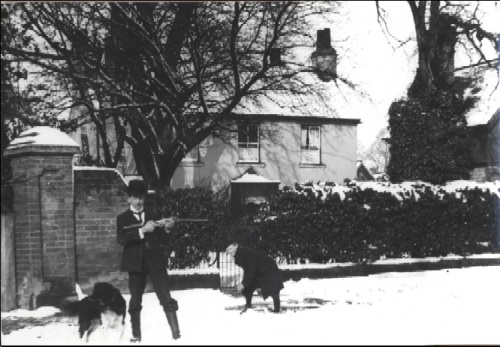Today both Dovegrey Reader and Stuck in a Book write about similar subjects: the stories behind people at the end of their lives. It makes me wonder about the lives of those I see all around me. None of them appear to be “ordinary” but maybe that is the whole point of life or lives, each of them extraordinary in their own way.
The photo above is of the house where my father and his siblings were born. As I grew up I thought that my father was one of three children. After his death I learnt that he was one of four; he had a half-brother who he knew as his cousin until a day in the the early 1970s when his sister and half-brother came to visit us. After my mother’s death I discovered that in fact he and his siblings were the second family of his father.
Researching family history I asked my aunt to fill in some gaps for me. Little did I expect the thirteen page letter that arrived , spilling its contents into my head like a Catherine Cookson saga. The letter and my own research caused episode after episode to unfold until truth became as unbelievable as fiction. In 1850, in Oxfordshire a twenty-nine year old spinster named Charity gave birth to my grandfather Charles, a name he would convieniently share with his second family’s other grandfather. For several years they lived with her parents and siblings but by 1861 her father was dead, her brother was head of the household and she and her child disappeared from view. We can only imagine the dramatic scene in Episode x of this saga. “Father is dead, I am head of the family now and you can get out and take that bastard with you.” My aunt’s sanitised version of her father’s early life was that he grew up in an orphanage. The harsher reality was that he spent his growing and early adult years in the workhouse. Merely seeing the word on paper, or reading it in your head conjures up awful images. Superficially it doesn’t appear to have harmed Charles. It seems to have at least instilled the work ethic into him. He stayed on once he was an adult to become first a “porter” and later “Assistant Labour Master”. I suppose that the workhouse and Poor Law was the forerunner of the Social Security system and indeed my grandfather took advantage of the system as much as anyone sitting for their Civil Service exams in later years. By the beginning of the twentieth century he had risen to being Registrar and Relieving Officer for an area stretching from Henley to Ascot. In other words people came to him to register births and deaths and he doled out Poor Relief. When he died he left a house (see above), a field and a cow. Nor bad for a boy from the workhouse.
If you want to see next week’s episode now, the tune into Channel X !

Friday, May 30, 2008 at 22:56
Fascinating – always fascinating to hear about one’s past. How close we feel to our parents, and yet how little we know of theirs, or theirs, or theirs. They must have wondered what their great-great-grandchildren would be like, but I don’t even know any of their names.
Less philosophically, I’ve tagged you for a meme!
http://stuck-in-a-book.blogspot.com/2008/05/playing-favourites.html